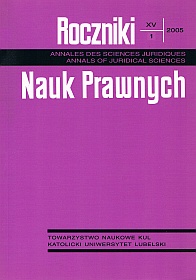The Judicial Prove in the Trials Concerning the Declaration of Marital Invalidity
Abstract
Marriage is an alliance by virtue of which man and woman establish a fellowship for the rest of their lives. The dignity and sacramental character of marriage call for an unconditional consent of both parties involved.
The law of the Latin Church permits, however, to express a conditional consent. This results from the fundamental thesis that no other human authority can replace consent. Therefore if there is a conditional marital consent, such it always remains. The paper shows the way to prove conditional marital consent in the trials for the declaration of marital invalidity.
References
Bonnet P. A.: Introduzione al consenso matrimoniale canonico, Milano 1985.
Dzięga A.: Miejsce biegłego w strukturze kanonicznego procesu o nieważność małżeństwa, [w:] Historia et Ius. Księga pamiątkowa ku czci Księdza Profesora Henryka Karbownika, red. A. Dębiński, G. Górski, Lublin 1998.
Fąka M.: Normy ogólne kanonicznego procesu sądowego, cz. II, Warszawa 1978.
Góralski W., Dzierżon G.: Niezdolność konsensualna do zawarcia małżeństwa kanonicznego, Warszawa 2001.
Góralski W.: Kanoniczna zgoda małżeńska, Gdańsk 1991.
Góralski W.: Matrimonium facit consensus. Z orzecznictwa Roty Rzymskiej w sprawach o nieważność małżeństwa z tytułów dotyczących zgody małżeńskiej (1984-1997), Warszawa 2000.
Hemperek P., Góralski W.: Komentarz do Kodeksu Prawa Kanonicznego z 1983 r., t. 1, cz. I, Lublin 1998.
Il consenso matrimoniale condizionato. Dottrina e giurisprudenza rotale recente, Città del Vaticano 1993.
Laskowski J.: Małżeństwo zawierane warunkowo, „Prawo Kanoniczne”, 24(1981), nr1-2, s. 175-188.
Leszczyński G.: Oświadczenia stron jako środek dowodowy w procesie o stwierdzenie nieważności małżeństwa, „Prawo Kanoniczne”, 43(2000), nr 1-2, s. 107-121.
Leuzzi A.: La condizione del consenso matrimoniale canonico dalla disciplina del 1917 a quella attuale, Roma 1993.
Majer P.: Wpływ błędu na ważność zgody małżeńskiej, [w:] Plenitudo legis dilectio, Lublin 2000, s. 439-462.
Pawluk T.: Prawo kanoniczne według Kodeksu Jana Pawła II, t. III, Olsztyn 1996.
Pawluk T.: Prawo kanoniczne według Kodeksu Jana Pawła II, t. IV, Olsztyn 1990.
Pinto P. V.: I processi nel Codice di Diritto Canonico, Città del Vaticano 1993.
Putrino G.: Il consenso matrimoniale condizionato, [w:] Matrimonio e disciplina ecclesiastica, Milano 1994, s. 101-113.
Sondel J.: Słownik łacińsko-polski, Kraków 1997.
Staffa D.: De condicione a qua pendet matrimonialis contractus, [w:] Questioni attuali di diritto canonico, Roma 1955, s. 219-242.
Sztychmiler R.: Obowiązki małżeńskie, Warszawa 1999.
Viladrich P. J.: Konsens małżeński. Sposoby prawnej oceny i interpretacji w kanonicznych procesach o stwierdzenie nieważności małżeństwa, tłum. S. Świaczny, Warszawa 2002.
Weigand R.: Die bedingte Eheschliessung im kanonischen Recht. II. Zur weiteren Geschichte der bedingte Eheschlissung. Rechtstheorie, Rechtsdogmatic, rechtsvergleich, Ottilien 1980.
Wróbel M.: Zawarcie małżeństwa pod warunkiem w świetle prawa kościelnego, Lublin−Sandomierz 2003.
Zubert W.: Error in persona et in qualitate personae (can. 1097 1-2 CIC 1983), [w:] Kościół i prawo, t. 13, Lublin 1998, s. 261-281.
Copyright (c) 2005 Roczniki Nauk Prawnych

This work is licensed under a Creative Commons Attribution-NonCommercial-NoDerivatives 4.0 International License.


